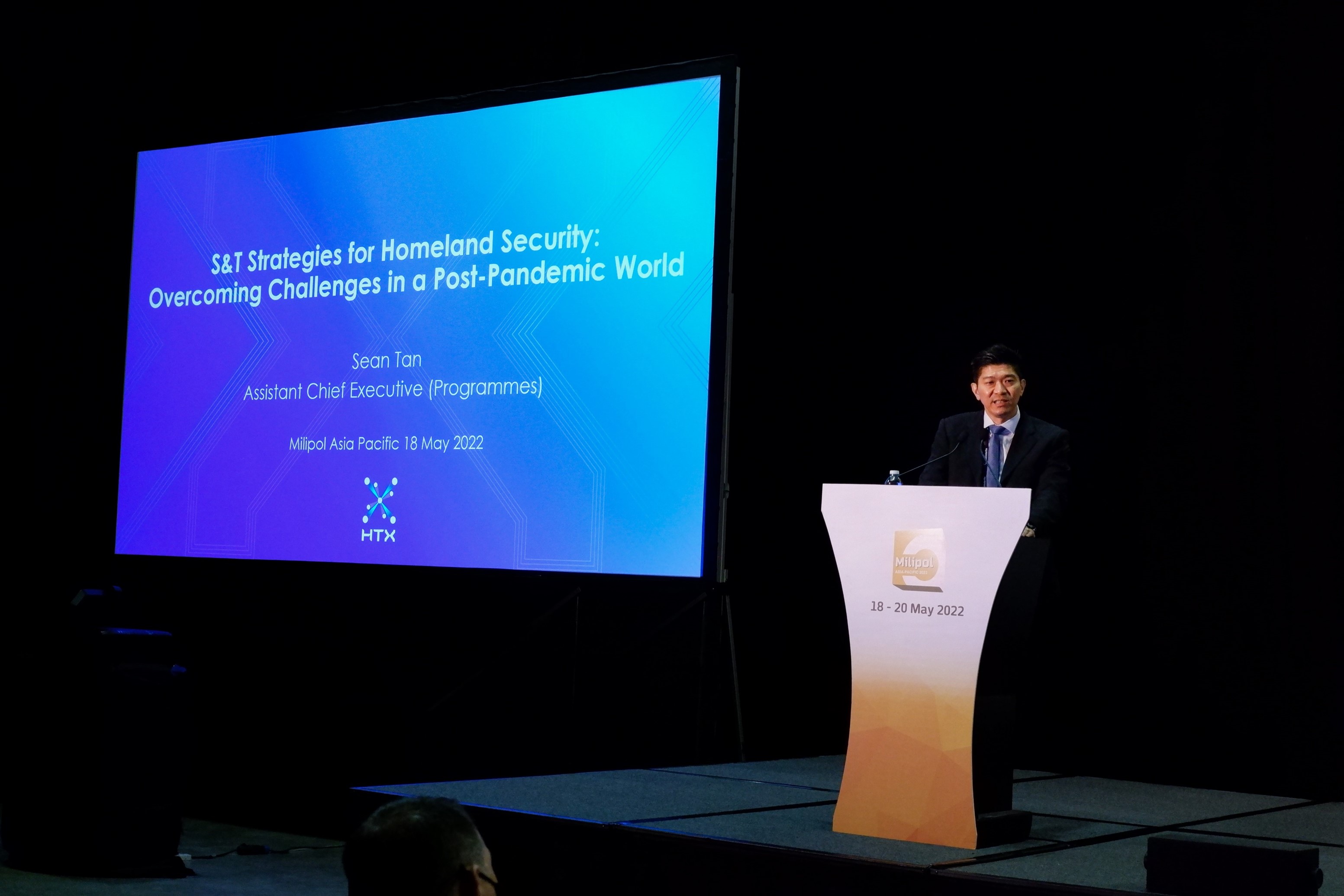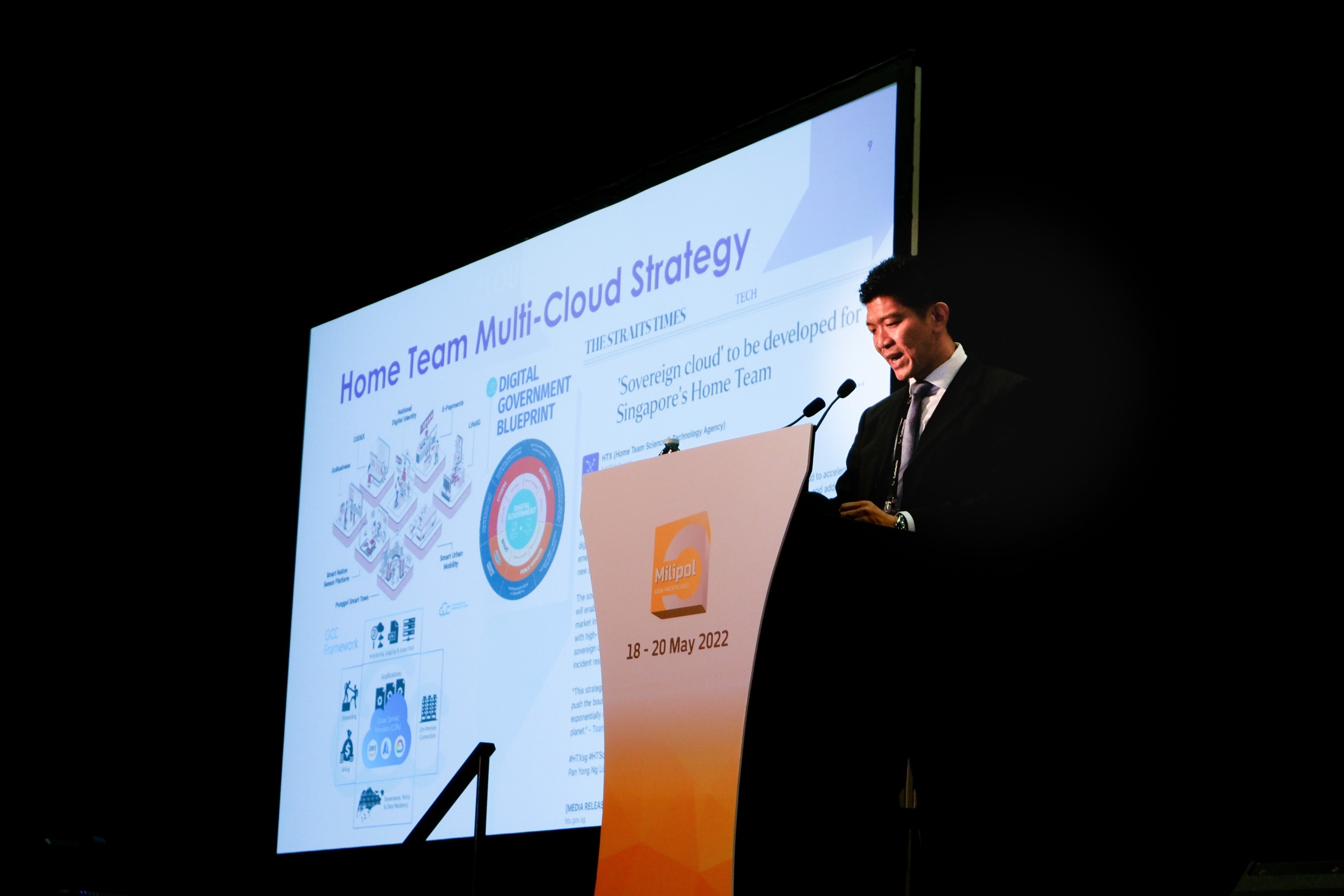
Investing in science and tech (S&T) capabilities is a priority and security agencies need to continue doing so at a much faster rate than before, said HTX Assistant Chief Executive (Programmes) Sean Tan.
He was speaking on the first day of Milipol Asia-Pacific 2022, an international homeland security exhibition and conference that took place from May 18 to 20 in Singapore. The event, themed “The Post Pandemic Challenges for Public and National Safety: Who has adapted better – Law Enforcement or Criminals?”, featured speakers from the Ministry of Home Affairs (MHA), Australia Federal Police, INTERPOL, and the industry.
Investing in S&T capabilities as a top priority
In his speech on “S&T Strategies for Homeland Security: Overcoming Challenges in a Post-Pandemic World”, Sean shared examples of how HTX was able to support the Whole-of-Government efforts in the fight against COVID-19 such as swab testing operations at the borders and sewage wastewater testing operations.
HTX was able to respond quickly to meet evolving operational requirements because “Fortune favours the Prepared,” Sean explained. MHA had already invested heavily in the science and tech domains before the pandemic struck and HTX – formed less than two months before COVID hit – was able to leverage, and in some cases, repurpose ongoing work to fit use cases. “COVID accelerated what we can do,” he said.
The pandemic also accelerated plans for a more secure, safer, and seamless immigration process. HTX is working with the Immigration and Checkpoints Authority to realise the New Clearance Concept (NCC) of automated clearance as the norm.
“Using a combination of biometric technology, data fusion and AI, we aim to automate the immigration clearance process and cut processing time by half for all travellers to Singapore, including foreign visitors,” Sean said.
HTX is also developing robotic platforms to augment frontline operations. The robotic dog Rover-X can be deployed to danger zones instead of human officers and Beyond-Visual-Line-of-Sight (BVLOS) drone operations can enhance capabilities for emergency situations, such as the delivery of Automated External Defibrillator (AED) in cardiac arrest cases.
Read related article: Robotic dog Rover-X tests its sight
Accelerating cloud adoption to super-charge transformation efforts

HTX Assistant Chief Executive (Programmes) Sean Tan speaking about the Home Team multi-cloud strategy at Milipol Asia-Pacific 2022 (Photo: HTX)
With the digital revolution upon us and accelerated by the COVID-19 pandemic, it is key for security agencies to fully embrace and harness digital tech to fuel transformation efforts, Sean said.
HTX recently announced a strategic partnership with Microsoft to develop Singapore’s first sovereign cloud – HEIDI or Hyperscale Enterprise Intelligent Digital Infrastructure.
HEIDI is part of the Home Team’s multi-cloud strategy. It will enable the faster deployment of digital capabilities as well as enhanced data security and stronger operational control compared to regular commercial cloud services.
“Moving forward, HTX will continue to expand our adoption of GCC [Government on Commercial Cloud] and HEIDI,” Sean said. “By leveraging services offered by cloud service providers, our scientists and engineers can focus on delivering innovative solutions without having to struggle with ICT infrastructure needs.”
With the encouraging trend of software providers now building an array of cloud-native solutions, governments and S&T agencies could explore and very quickly develop new capabilities such as in cybersecurity, 5G, data science, AI, wearable tech, and autonomous systems.
“Digitalisation is an area that would demand huge resource investments, uplifting of competencies through training. But certainly an area that cannot be delayed much further,” Sean said.
Read related article: TechXplain – Clout of the Cloud
Partnerships and Innovation to push the S&T edge
Engaging partners actively is a key strategy as no agency can build every S&T capability on its own, Sean said. HTX has built close collaborations with partners across all sectors including government agencies, industry, research institutes and academia, to push operational boundaries at a faster and more effective pace.
“The post-pandemic world would certainly be one that is much more volatile and uncertain,” Sean said. “While we may not be able to predict accurately what comes next, what’s more important is to position ourselves for the next wave.”
Read related article: HTX's first TechX Summit marks the spot

